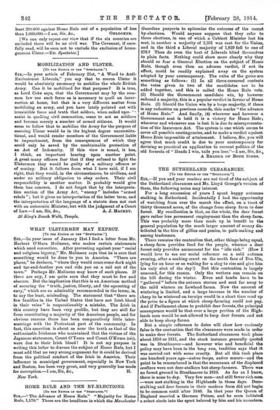MOBILIZATION AND ULSTER.
[To ens EIMVIS OW 555 ODSOU206.1 Era,—In your article of February 21st, " A Word to Anti. Exclusionist Liberals," you say that to coerce Ulster it would be absolutely necessary to mobilize the whole British ArMy. Can it be mobilized for that purpose P It is true, as Lord Coke says, that the Government may by the com- mon law use inch force as is necessary to quell an insur- rection at home, but that is a very different matter from mobilizing an army, and you have lately pointed out with irresistible force and truth that solders, when called upm `- assist in quelling civil commotion, cease to act as soldiers and become merely a number of armed citizens. It would seem to follow that to mobilize the Army for the purpose of coercing Ulster would be in the highest degree unconstitu- tional, and would render members of the Government liable to impeachment, from the consequences of which they could only be saved by the unobtainable protection of an Act of Indemnity. If this view is sound, it has, I think, an important bearing upon another point. A great many officers fear that if they refused to fight the Ulstermen they would be guilty of a military offence or of mutiny. But it follows from what I have said, if I eta right, that they would, in the circumstances, be civilians, and under no military obligation to obey orders. Their civil responsibility is another matter. It probably would give them less concern. I do not forget that by the interpreta- tion section of the Army Act, "enemy" includes "armed rebels " ; but it gives no interpretation of the latter term, and the interpretation of the language of a statute does not rest with an autocratic Minister, but with the judgment of a. Court of Law—I am, Sir, Sze, A. J. MACKEY. 10 King's Bench Walk, Temple.














































 Previous page
Previous page